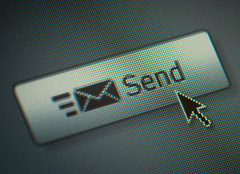Web-based e-mail—webmail—is e-mail, such as Gmail, Hotmail, and Yahoo, that's implemented as a Web app and accessed through a browser. These services are usually free, and it's a rare computer user who doesn't have at least one active webmail account. But I restrict my use of webmail because of security and privacy concerns. (Dean Gallea, a senior program leader at Consumer Reports, takes the opposite view; check here tomorrow for his counterpoint argument, "5 Reasons to Use Webmail.")

I do have accounts with some webmail services, mainly to use my smart phone or tablet or to communicate with colleagues at work. But I don't use webmail for my personal e-mail. To send and receive strictly personal messages on my home computer, I use standalone, client-based e-mail software, which is installed on a computer and works offline. Here's why:
A bird in the hand. I prefer keeping copies of personal data within my physical possession as much as possible. That way, I can read it, delete it, or create backup copies at any time, even during an Internet outage and no matter what happens to my e-mail service provider.
Saving most e-mail uses relatively little hard-drive space, and a program such as Outlook 2010 can accommodate 20GB or more of saved correspondence and file attachments. Consequently, you can save as many outgoing and incoming messages as you want for pretty much as long as you want. In return for these benefits, I'm willing to take responsibility for periodically backing up this data to an external drive, which usually takes no more than a few minutes.
Better performance. Standalone e-mail software is generally snappier and better designed than browser-based webmail, and its user interface is more customizable. And standalone software is more secure than browser-based webmail, which relies on plug-ins and add-ons, such as JavaScript, which have experienced numerous security problems that have exposed them to hacking or malware. Plus, with standalone software, you can answer e-mail even when you're offline, then send it later.
Your domain is your castle. When you own an Internet domain, you can create and use an easy-to-remember e-mail address like [email protected], instead of something more cryptic such as "[email protected]" or "[email protected]." Yes, it costs a few dollars per year. But it's worth the money, because it also makes your e-mail address less obvious to spammers—far fewer people know about my domain than are familiar with domains such as gmail.com and hotmail.com.
I also have a Web-hosting account set up for my domain, which does increase my annual costs. But it lets me set up multiple e-mail addresses within that domain for different purposes, such as [email protected], [email protected], and [email protected]. When a particular address starts to attract too much spam, you can delete it and create a new one. So far, the addresses that I have been using for the past couple of years have not attracted an unmanageable amount of spam.
Multiple addresses also make it easy to keep family and non-family communications separate. Some webmail services may let you set up several e-mail addresses on a single account, but when I tried to do so with some popular services, I could not easily figure out how to do it.
Privacy. The e-mails you send and receive, if not encrypted, may well be scrutinized, in transit, by government agents hunting for criminals and terrorists. Still, I believe that using standalone e-mail software better protects correspondence and address books from hackers and other snoops than webmail does. That's because I configure my e-mail software to remove all new messages from the POP server whenever I retrieve new e-mail. With webmail, past messages you retain, as well your list of contacts, could remain on the server—potentially exposed to hackers—for long time periods.
Another privacy plus: My e-mail provider doesn't scan my e-mail in order to serve targeted ads. In fact, it doesn't serve ads at all, because I read my mail using ad-free standalone software. True, that standalone software could be hijacked by a virus. But to avoid that, keep your computer updated with the latest security patches, be cautious about opening attachments or clicking on embedded links in e-mail, and run a security software suite that performed well in Cosumer Reports' latest security software Ratings.
Webmail's main benefits are that it's free, available on nearly any computer, and automatically updated without time-wasting downloads. In fact, occasionally, I use the webmail feature of my Web-hosting account when there's no other way to check my e-mail.
Still, whenever possible, I prefer the performance and privacy of a standalone e-mail program. And you don't always have to pay for an e-mail program, either: On computers other than my main one, I use the free e-mail client, Mozilla Thunderbird.





